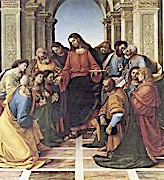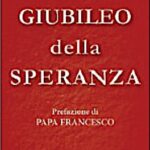Illustration:The Communion of the Apostles, by Luca Signorelli, 1512
Pope Francis’ address to the international congress on the Future of Theology
organized by the Dicastery for Culture and Education
Hall of Benediction – Monday, 9 December 2024
_____________________________
” All theology is born of friendship with Christ, with brothers, sisters and His world“
Dear sisters and brothers,
I am happy to see you and to know that such a large number of professors, researchers and deans from all over the world have come together to reflect on how to appropriate the great theological patrimony of past generations and to imagine its future.
I thank the Dicastery for Culture and Education for this initiative.
I also thank you, dear theologians, for your work, which is often hidden but necessary indeed.
I hope that this Congress will be the first step of a fruitful common project.
I have learned that some academic institutions, theological associations and some of you as individuals have contributed to the travel expenses of others of lesser means.
This is very good! Let us continue to move forward together! If faith and love make us reach down into our pockets, that is not a bad thing! If they stop first, something is missing.
Let me begin by saying that when I think of theology, I think of ‘light’ . Thanks to light, objects emerge from the darkness, faces reveal their contours, the shapes and colors of the world finally become visible. Light is beautiful because it makes things appear but without showing itself.
Have any of us seen light? No, but we see what light does: it makes things visible.
Now, here, we admire this room, we see each other, but we do not see the light, because it is discreet, gentle, humble and, therefore, remains unseen. Light is “kindly”.
Theology is like that: it works quietly and humbly so that the light of Christ and his Gospel can shine. This observation can point the way for you. Seek God’s grace and persevere in the grace of friendship with Christ, the true light who came into this world.
All theology is born of friendship with Christ and love for his brothers, his sisters and his world.
This world is magnificent and tragic, filled with overwhelming beauty but also great suffering.
I understand that these days you will be working together on the “where”, the “how” and the “why” of theology. We may wonder: Theology, where are you? With whom are you going? What are you doing for humanity? These days will be important in addressing these questions and in asking whether the theological heritage of the past can still speak to the challenges of today and help us imagine the future.
This is a journey you are called to undertake together as theologians of both sexes.
Here I think of an episode in the Second Book of Kings. During the restoration of the Temple in Jerusalem, a text came to light; perhaps it was the first edition of Deuteronomy, which had been lost.
A priest and several scholars read it, as did the king. They sensed its significance but did not understand it. So the king decided to give it to a woman, Huldah, who immediately understood its meaning and helped the group of scholars – all men – to understand it. (see 2 Kings 22:8:20 in a footnote below)
There are things that only women understand and theology needs their contribution.
An all-male theology is an incomplete theology. We still have a long way to go in this direction.
And now let me leave you with a desire and an invitation.
1. Desire
The wish is this: that theology will help us to rethink the way we think.
Our way of thinking, as we know, also shapes our feelings, our will and our decisions.
A broad heart is accompanied by a broad imagination and thinking, whereas a shrunken, closed and mediocre way of thinking is hardly capable of generating creativity and courage. I think of the theology manuals we studied, all closed, all “museum pieces”, all “bookish”, without making you think.The first thing to do, in rethinking is to move beyond simplification.
Reality is complex; challenges are many; history is full of beauty and at the same time marred by evil. When someone cannot or will not deal with its dramatic complexity, then he or she is easily tempted to simplify. But Simplification mutilates reality.
It leads to empty and one-sided thinking, polarization and fragmentation.
That, for example, is precisely what ideologies do. Ideology is a simplification that kills: it kills reality, it kills thought, it kills community. Ideologies flatten reality into a single, shallow idea, which they then obsessively repeat and manipulate like parrots.
An antidote to oversimplification is provided by the Apostolic Constitution Veritatis Gaudium:
inter-disciplinary and cross-disciplinary approaches (Foreward, 4c – From this follows the third fundamental criterion that I would propose: inter-disciplinary and cross-disciplinary approaches carried out with wisdom and creativity in the light of Revelation. What distinguishes the academic, formative and research approach of the system of ecclesiastical studies, on the level of both content and method, is the vital intellectual principle of the unity in difference of knowledge and respect for its multiple, correlated and convergent expressions.).
This means letting theological reflection “ferment” in combination with other disciplines:
philosophy, literature, the arts, mathematics, physics, history, law, politics and economics.
These disciplines should ferment, because, like the senses of the body, each has its own specific function, yet they need each other, because, as the Apostle Paul points out, “If the whole body were an eye, where would be the hearing? If the whole body were an ear, where would the sense of smell be?” (1 Cor 12:17).
This year we celebrate the 750th anniversary of the death of two great theologians: St. Thomas Aquinas and St. Bonaventure. St. Thomas says that we do not have a single sense, but several and different senses, so that reality does not escape us (De Anima, lib. 2, lect. 25). St.Bonaventure states that to the extent that one “believes, hopes and loves Jesus Christ” one “regains hearing and sight…, smell…, taste and touch” (Itinerarium Mentis in Deum, IV, 3). By helping to rethink the way we think, theology will once again shine as it should, in the Church and in different cultures, helping everyone in search of truth. This is the desire.
2. Make theology accessible to all.
I would now like to leave you with an invitation, namely, that theology should be accessible to all.
For some time now, in many parts of the world there has been an interest among adults to resume their education, including their academic education.
Men and women, especially in middle age and perhaps with a degree, want to deepen their faith, to try something new; they often enroll in university courses.
This is a growing phenomenon that deserves the interest of society and the Church.
Middle age is a special time in life.
It is a time when one usually enjoys a degree of professional security and emotional stability,
But it is also a time when failures are painfully felt and new questions arise as youthful dreams fade.
When this happens, people can feel abandoned or even at a dead end – a mid-life crisis.
Then they feel the need to renew their search, however tentatively, perhaps even with a helping hand.
Theology can be that guide along the way!
Please, when any of these people knock on the door of theology, of theological schools, may they find it open. Make sure that these women and men find in theology an open house, a place where they can continue their journey, a place where they can seek and find and seek again. Be prepared for this.
Make imaginative adjustments to your programs of study so that theology can be accessible to all.
Dear sisters and brothers, I have been told that this will not be just another conference where some people speak and the others listen (or fall asleep!), but that everyone will have a chance to speak and be listened to. Good! Everyone has something to teach us. Even little old ladies, who are wise.
I would ask the Dicastery for Culture and Education to let me know the results of your deliberations, for which I thank you. I cordially bless you.
And I ask you, please, to not to forget to pray for me. This work is enjoyable, but difficult!
Footnote
(2 Kings 22:14-8 Hilki′ah the high priest said to Shaphan the secretary, “I have found the book of the law[a] in the house of the Lord.” And Hilki′ah gave the book to Shaphan, and he read it. 9 And Shaphan the secretary came to the king, and reported to the king, “Your servants have emptied out the money that was found in the house, and have delivered it into the hand of the workmen who have the oversight of the house of the Lord.” 10 Then Shaphan the secretary told the king, “Hilki′ah the priest has given me a book.” And Shaphan read it before the king. 11 And when the king heard the words of the book of the law, he rent his clothes. 12 And the king commanded Hilki′ah the priest, and Ahi′kam the son of Shaphan, and Achbor the son of Micai′ah, and Shaphan the secretary, and Asai′ah the king’s servant, saying, 13 “Go, inquire of the Lord for me, and for the people, and for all Judah, concerning the words of this book that has been found; for great is the wrath of the Lord that is kindled against us, because our fathers have not obeyed the words of this book, to do according to all that is written concerning us.”
So Hilkiah the priest, and Ahikam, and Achbor, and Shaphan, and Asaiah went to Huldah the prophetess, the wife of Shallum the son of Tikvah, son of Harhas, keeper of the wardrobe (now she dwelt in Jerusalem in the Second Quarter); and they talked with her. 15 And she said to them, “Thus says the Lord, the God of Israel: ‘Tell the man who sent you to me, 16 Thus says the Lord, Behold, I will bring evil upon this place and upon its inhabitants, all the words of the book which the king of Judah has read. 17 Because they have forsaken me and have burned incense to other gods, that they might provoke me to anger with all the work of their hands, therefore my wrath will be kindled against this place, and it will not be quenched. 18 But as to the king of Judah, who sent you to inquire of the Lord, thus shall you say to him, Thus says the Lord, the God of Israel: Regarding the words which you have heard, 19 because your heart was penitent, and you humbled yourself before the Lord, when you heard how I spoke against this place, and against its inhabitants, that they should become a desolation and a curse, and you have rent your clothes and wept before me, I also have heard you, says the Lord. 20 Therefore, behold, I will gather you to your fathers, and you shall be gathered to your grave in peace, and your eyes shall not see all the evil which I will bring upon this place.’” And they brought back word to the king.).


